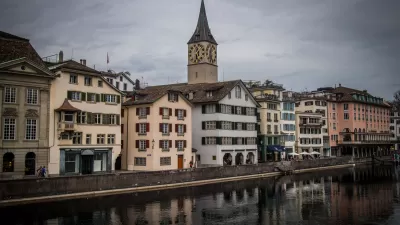The Economist's Intelligence Unit has once again ranked Melbourne as the top city in its annual Global Liveability Ranking. Damascus has dropped to the bottom of the list due to Syria's ongoing civil war.
For the third year in a row, Melbourne has topped the Economist Intelligence Unit's annual Liveability report, narrowly edging out Vienna, Vancouver, and Toronto. "The ranking scores 140 cities on a scale of zero to 100 for each of 30 factors such as the quality of public healthcare or the threat of military conflict."
"A glance at the top ten shows that the cities that do best are mid-sized conurbations in countries with low population densities, because such conditions will often result in low crime, working infrastructure and lots of recreational activities," notes The Economist's Graphic Detail blog. "The comparatively poor performances of London and New York can be mainly attributed to their stability scores, which are low because of a perceived terrorism risk."
FULL STORY: Movers and shakers on the EIU’s city liveability ranking

Planetizen Federal Action Tracker
A weekly monitor of how Trump’s orders and actions are impacting planners and planning in America.

Map: Where Senate Republicans Want to Sell Your Public Lands
For public land advocates, the Senate Republicans’ proposal to sell millions of acres of public land in the West is “the biggest fight of their careers.”

Restaurant Patios Were a Pandemic Win — Why Were They so Hard to Keep?
Social distancing requirements and changes in travel patterns prompted cities to pilot new uses for street and sidewalk space. Then it got complicated.

Platform Pilsner: Vancouver Transit Agency Releases... a Beer?
TransLink will receive a portion of every sale of the four-pack.

Toronto Weighs Cheaper Transit, Parking Hikes for Major Events
Special event rates would take effect during large festivals, sports games and concerts to ‘discourage driving, manage congestion and free up space for transit.”

Berlin to Consider Car-Free Zone Larger Than Manhattan
The area bound by the 22-mile Ringbahn would still allow 12 uses of a private automobile per year per person, and several other exemptions.
Urban Design for Planners 1: Software Tools
This six-course series explores essential urban design concepts using open source software and equips planners with the tools they need to participate fully in the urban design process.
Planning for Universal Design
Learn the tools for implementing Universal Design in planning regulations.
Heyer Gruel & Associates PA
JM Goldson LLC
Custer County Colorado
City of Camden Redevelopment Agency
City of Astoria
Transportation Research & Education Center (TREC) at Portland State University
Camden Redevelopment Agency
City of Claremont
Municipality of Princeton (NJ)





























